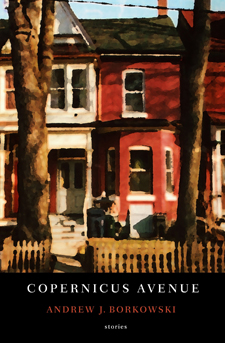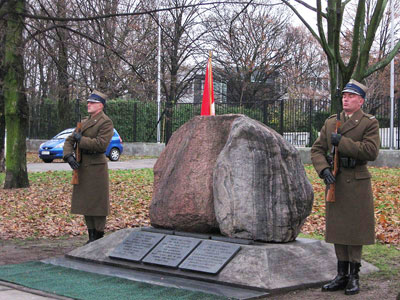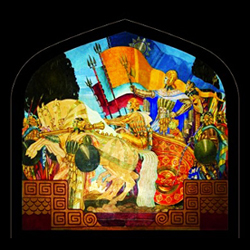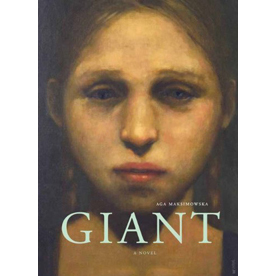 It’s only been since my father’s generation has begun to pass away that I’ve come to recognize that their stories are the richest part of my inheritence…
It’s only been since my father’s generation has begun to pass away that I’ve come to recognize that their stories are the richest part of my inheritence…
Copernicus Avenue
By Andrew J. Borkowski
Cormorant Books, Toronto 2011
ISBN 978-1-7708-60018
If there’s one neighborhood in Canada that came to be known as “Little Poland,” it is Toronto’s Roncesvalles Village. Home to thousands of postwar Polish exiles, it was a rather shabby, decaying district of large old houses abandoned by the younger generation of Canadians for life in the new leafy suburbs of Toronto. The old houses were perfect for subdividing into flats and rooming houses where it was not uncommon for three families to share one bathroom, while the small shops on the area’s main street provided easy access to the necessities of life for people without cars, though it would be a while before these new immigrants could start setting up businesses of their own. Today, the Polish presence is very much in evidence on Roncesvalles Avenue with plenty of Polish restaurants, delis and other businesses though, ironically, most of the Polish residents have followed the usual pattern and moved to larger houses and greener lawns in the suburbs of Toronto.
Andrew J. Borkowski, a Canadian freelance journalist, has been published in The Globe and Mail, The Canadian Forum, TV Guide and the Los Angeles Times, while his short fiction has appeared in The New Quarterly and Storyteller Magazine. He grew up in Roncesvalles Village, his father a Polish airman, his mother the daughter of English immigrants who had come to Canada before the war. That combination may well be the reason why Copernicus Avenue combines a very mainstream Canadian sensibility with a sensitive understanding of the immigrants he’s writing about.
Copernicus Avenue is Borkowski’s fictional recreation of the postwar Roncesvalles neighbourhood and weaves together a series of short stories about people who had just come through the Kafkaesque experience of being on the wining side of a war… and losing everything. The result is touching, sad, funny and insightful.
The opening story, The Trees of Kleinsaltz, is a tour de force, as powerful as it is unsettling. When a young man comes upon his uncle viciously attacking a tree, he defends the tree but in the end concedes it was his tree to cut, or not, no further questions asked. What follows is a terse but masterful account of atrocities committed by two invading armies in successive waves of attack and retreat as the German and Russian armies wage war against unarmed civilians. The reader is introduced to violent upheavals, and new beginnings. In the end, the story returns to the uncle and the tree, in a climax that chills and shocks.
The story closest to Borkowski’s own is the romance and marriage of the Polish air force veteran, Thadeus, and the Canadian girl, Marlene. She was seduced by his good manners, that much-noted “gallantry” so traditional in Polish gender relations of prewar Poland. It seemed she didn’t regret it though this man, who could have moved on to a comfortable assimilated life, stayed on to help his less fortunate compatriots.
The subsequent stories unfold in Canada, mainly but not exclusively in Toronto. Each story introduces new characters, all of them bearing the scars of their encounters with war and with the totalitarian regime that was later imposed, each one dealing with it differently. (Twelve Versions of Lech is a marvelous character study of a refugee from communist totalitarianism.) Some are stoical, some cynical, some find comfort in religion, others find shelter in pragmatism, still others suffered permanent psychological trauma.
For the religious, the comfort would come from the Polish church, with Polish priests sent over from Poland, because little comfort could possibly come from the established Irish clergy. Borkowski has a little fun with this, though one wishes he had played a bit more with this one.
The second generation is introduced, but they are almost ersatz Canadians, with funny unpronounceable names and, especially as cadets in the armed forces, trying to be what they were not. Canadian multiculturalism had not kicked in yet, back in the 1970s, and suppressing your real identity was the norm. Perhaps only a Polish reader would see in this the reason why the second generation took so long to see the drama, the honour, and the valour in their families’ stories.
It is not easy to tell a big story using a series of interconnected short stories and Borkowski doesn’t entirely succeed, but then, had he wanted to write a novel he would have done so. Instead, he has given us stories that do succeed in bringing to life a rich variety of characters, each contributing to a picture of the traumatized Polish community that went on to become a successful Canadian one. An interesting current throughout is the conflict between Thadeus and Marlene’s two sons, two opposing personalities, perhaps each representing the inner conflict of the children of immigrants.
The final stories return to Thadeus, now old and spending his time in High Park. He goes to church on St. David’s Day and thinks back to his air force days in Wales, and to his Polish comrades who never made it. What follows is a riveting account of a dangerous flight made by men who already knew that their allies had betrayed them. He remembers but holds no grudges. He decides what he wants done with his ashes, half buried with Marlene, the other half buried in Warsaw.
The book ends with the second generation, with a trip back to Baranica – now in Belarus and not in Poland – to visit the site where the family had been massacred and to pay respects. Nothing can be undone, nothing can be allowed to be forgotten. Life goes on.
CR



